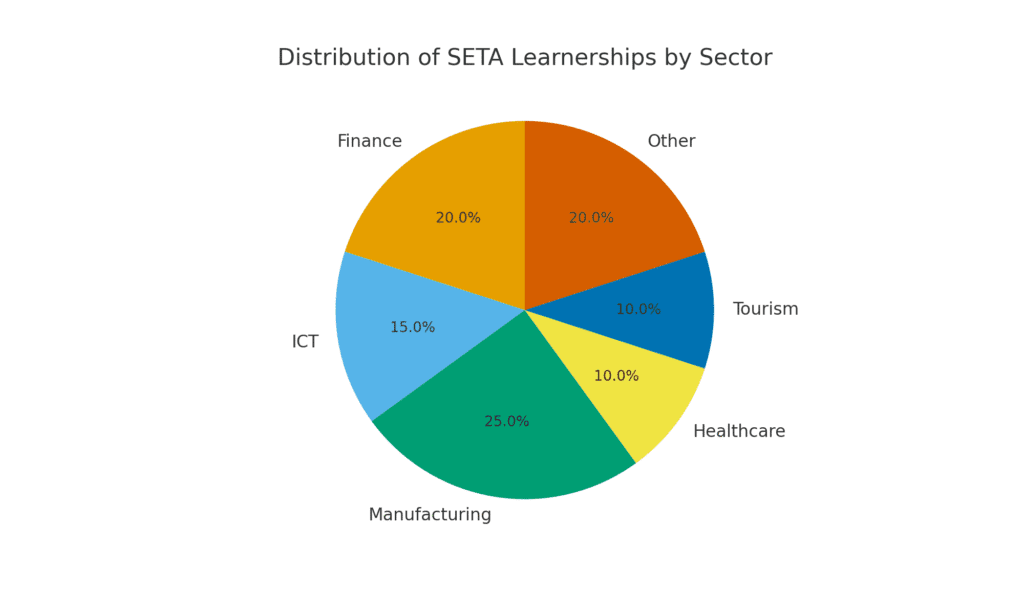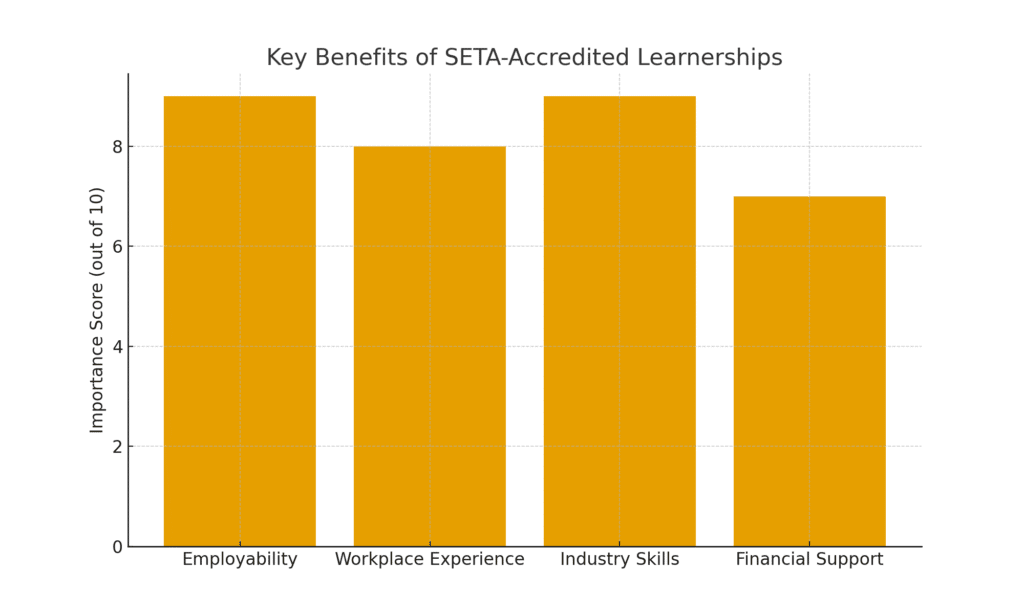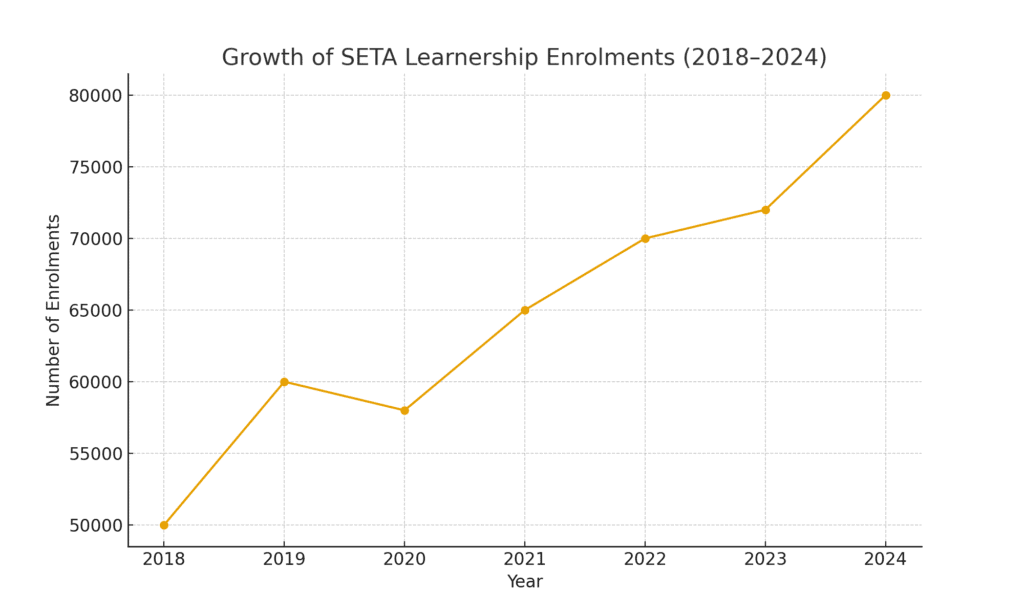South Africa is a country full of potential, but one challenge remains: the gap between education and the real-world job market. This is where Sector Education and Training Authorities (SETAs) step in. Through their accredited learnerships, thousands of young South Africans are building careers, gaining recognized qualifications, and improving employability.
This guide will explain what SETA-accredited learnerships Programme are, how they work, the benefits, and how you can apply. Along the way, we’ll use real data, case studies, and visual charts to make your journey clear and actionable.
👉 For more step-by-step guides, explore our Edupage Learnership Opportunities Hub.
Understanding SETAs and Their Role in Learnerships
What Are SETAs?
Sector Education and Training Authorities (SETAs) were established under the Skills Development Act to drive skills development across the economy. Each SETA focuses on a specific industry—such as finance, healthcare, agriculture, ICT, tourism, or manufacturing.
Their key responsibilities include:
- Accrediting training providers
- Funding skills development programmes
- Ensuring training aligns with National Qualifications Framework (NQF) standards
- Bridging the gap between education and employment
👉 Learn more about how SETAs function in our Edupage SETA Guide.
Why SETA Accreditation Matters
A SETA-accredited learnership guarantees that:
✅ Your qualification is nationally recognized
✅ The programme meets NQF standards
✅ Your training matches industry demands
✅ Employers respect the certification
Without accreditation, a programme may not hold the same weight in the job market. That’s why always checking for SETA approval is your first step.
Key Sectors Covered by SETAs
SETA programmes span across all critical sectors in South Africa. Here’s how the distribution looks:
As shown, Manufacturing and Finance SETAs lead in programme availability, while ICT, healthcare, and tourism also represent significant opportunities.
👉 Explore detailed sector insights on our Edupage Career Development Page.
What Constitutes a SETA-Accredited Learnership?
The Learnership Model
A learnership combines:
- Theory (classroom or online study)
- Practical work experience (on-the-job training)
This blended model ensures learners gain hands-on skills while working towards a recognized qualification.
Programme Structure
- Agreement Signing – Learner, employer, and training provider formalize responsibilities.
- Theoretical Learning – Coursework linked to an NQF qualification.
- Practical Experience – Workplace exposure and skills application.
- Final Assessment – Evaluation of both theoretical and workplace performance.
⏳ Duration: Typically 12–24 months, depending on the qualification level.
Distribution of SETA Learnerships by Sector

Benefits of SETA-Accredited Learnerships
Why should you consider this pathway? Let’s break it down:
- Enhanced Employability – Graduates are job-ready with relevant experience.
- Workplace Exposure – Learn real-world problem-solving on the job.
- Industry-Relevant Skills – Training aligns with current sector needs.
- Financial Support – Stipends and funded training reduce financial barriers.
👉 Check out available stipends and support opportunities on our Edupage Funding & Bursaries Page.
Growth of Learnerships in South Africa
The demand for learnerships has been growing steadily, proving their role in bridging youth unemployment and skills gaps.
Between 2018 and 2024, enrolments have climbed from 50,000 to over 80,000, with expectations for further growth in 2025 and beyond.
How to Find and Apply for Learnerships
Step 1: Identify Your SETA
Match your career interest with the relevant SETA. For example:
- Finance and Accounting → Finance SETA
- Healthcare → Health and Welfare SETA
- IT & Communications → MICT SETA
👉 Visit our Edupage SETA Directory for a full list.
Key Benefits of SEATA-Accredited Learnerhips

Step 2: Search for Opportunities
- Company career pages (e.g., Shoprite, Eskom, Transnet)
- SETA websites
- Government job portals
- Reputable training providers
Step 3: Apply with Required Documents
Prepare:
- Certified copies of your ID and Matric certificate
- Updated CV
- Motivation letter (optional but recommended)
Real-World Impact: Success Stories
Sarah – From Beginner to IT Specialist
Sarah joined a MICT SETA learnership with only basic computer skills. Within two years, she became a network technician and secured a permanent job.
Thabo – From Factory Floor to Supervisor
Thabo completed a Manufacturing SETA learnership, moving from general worker to shift supervisor. His training helped him climb the corporate ladder quickly.
👉 Read more inspiring journeys on our Edupage Success Stories Page.
Grouth of SETA Learnership Enrolments (2018-2024

Employer Perspectives
Employers highly value SETA graduates:
“Learnership graduates hit the ground running. They already understand real-world workflows, which saves us training time.” – Factory Manager, Gauteng
Businesses benefit from:
- Skilled entry-level employees
- Improved productivity
- Access to skills development tax incentives
Your Next Steps
SETA-accredited learnerships are more than training—they are a career launchpad. By joining, you:
- Gain recognized qualifications
- Build practical work experience
- Access financial support
- Increase your employability
🚀 Don’t wait. Start exploring opportunities today:
👉 Browse Current Learnership Listings on Edupage
Final Thoughts
South Africa’s economic growth depends on a skilled workforce. Learnerships provide the bridge between education and employment, ensuring that young people are not just qualified but job-ready.
By choosing a SETA-accredited programme, you invest in your future and contribute to the nation’s development.
📌 Whether you dream of working in finance, ICT, healthcare, or tourism, there’s a learnership waiting for you.



0 Comments